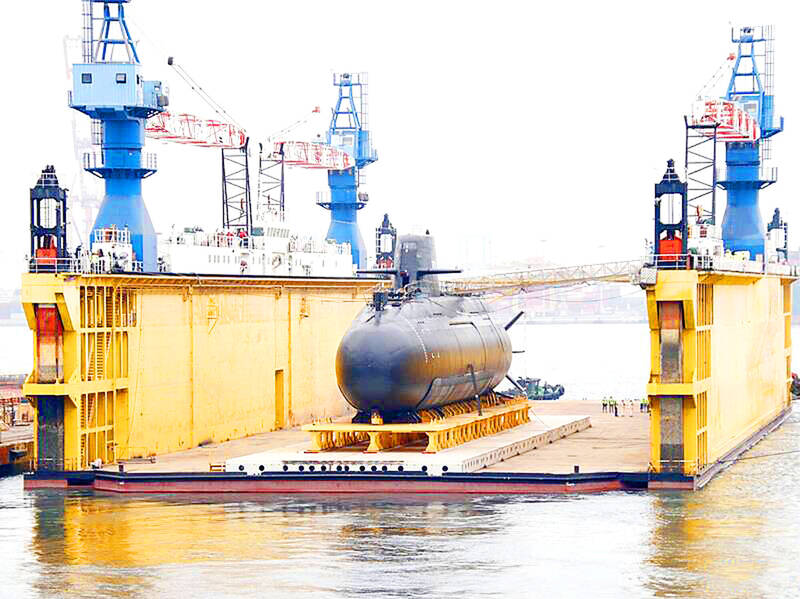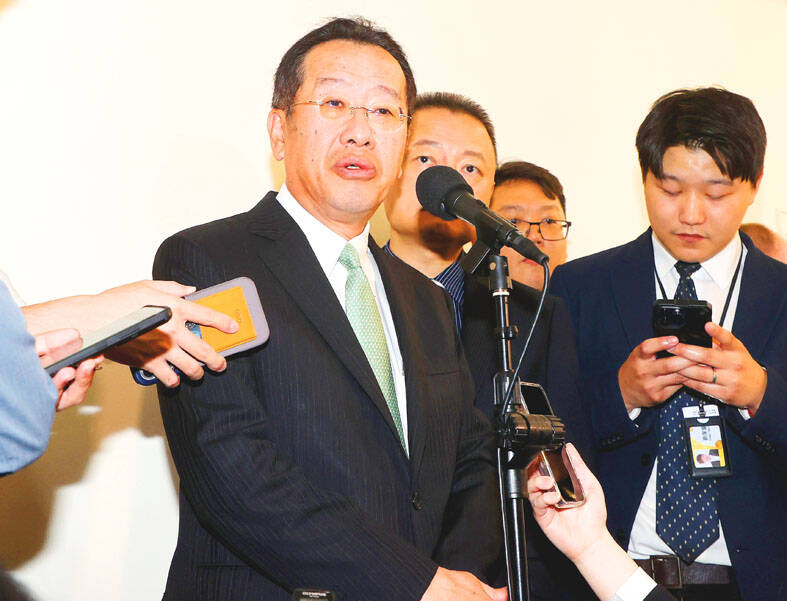The harbor acceptance test (HAT) for the Hai Kun (海鯤), or “Narwhal,” an indigenous defense submarine (IDS) prototype, is nearly complete and the vessel is expected to be delivered to the navy before the end of next year as scheduled, the navy said yesterday.
The HAT for the IDS prototype is 83 to 85 percent complete, Republic of China Navy Chief of Staff Vice Admiral Chiu Chun-jung (邱俊榮) told a meeting of the legislature’s Foreign Affairs and National Defense Committee.
This would be followed by a sea acceptance test (SAT), which is expected to begin in April next year and conclude by October before the vessel is delivered in November, Chiu said, adding that the testing process is on time and on schedule.

Photo: Lee Hui-chou, Taipei Times
Taiwan’s first domestically built submarine prototype was unveiled in Kaohsiung in September last year at a ceremony presided over by then-president Tsai Ing-wen (蔡英文). The prototype began HAT in October last year and has been going through the final stages of the process since Feb. 27.
The IDS project is part of a proposal by the military to build seven submarines from next year to 2038 at an estimated cost of NT$284 billion (US$8.74 billion), which was approved by the Cabinet on Aug. 30. The budget proposal still needs to clear the Legislative Yuan.
For next fiscal year, the Ministry of National Defense has budgeted approximately NT$1.996 billion for the production of new submarines.

Photo: CNA
Minister of National Defense Wellington Koo (顧立雄) said that the government would not spend a dime on construction plans for new submarines until the Hai Kun prototype passes its sea acceptance test, but that not allocating a budget this year might affect the progress of the construction plan.
Koo made the remarks in response to media queries for comment after Chinese Nationalist Party (KMT) Legislator Hsu Chiao-hsin (徐巧芯) said that she would propose slashing the budget by NT$1.796 billion, while fellow KMT legislators Huang Ren (黃仁) and Ma Wen-jun (馬文君) said they would propose eliminating the entire budget.
If the fund is budgeted this year, the navy can quickly use it to build new submarines if the Hai Kun passes its sea acceptance test next year, Koo said.
“If the budget is not compiled this year, but compiled after the SAT is passed, it might make it to the budget preparation deadline in August next year. The budget for submarines would thus not be compiled until the year after next. The entire schedule for subsequent submarines would be delayed as a result,” Koo said.
Koo pledged that the budget plan would be compiled based on the testing results of the prototype submarine, and the ministry would submit the plan to the Legislative Yuan for review.
KMT Legislator Chen Yeong-kang (陳永康) said he believed that it is not the budget that affects the submarine-building schedule, but CSBC Corp, Taiwan’s (台船公司) unclear shipbuilding schedule.
Workers, schedules and facilities that are involved in shipbuilding are not isolated issues, and the government cannot budget funds ahead of time without knowing whether the schedule and quality of the submarines match expectations, he said.
The ministry has not disclosed details of submarine contracts and export license conditions either, he said.
The first and second phases of domestic submarine production began in 2016 and lasted for eight years, but the funding for the third phase needs to be budgeted all the way until 2038, Hsu said.
She suggested re-evaluating the whole process by separating the budget items into “2 + 3 + 2” as stages for the indigenous submarine building program, adding that this would enable a more efficient use of the defense ministry’s budget.
Democratic Progressive Party Legislator Wang Ting-yu (王定宇), coconvener of the Foreign Affairs and National Defense Committee, said that the ministry’s budget plan of close to NT$2 billion is not high in proportion to the total fiscal budget.
“The budget plan to facilitate progress on this path to safeguarding the security of our nation,” he said.
Taiwan People’s Party (TPP) Legislator Lin Yi-chun (林憶君) said she would opt to “freeze” instead of cutting the budget.
As the prototype is still undergoing testing, she said she would propose freezing the budget by half.
TPP caucus whip Huang Kuo-chang (黃國昌) said that the party has always believed that Taiwan should bolster its national defense, adding that it would support a military procurement budget that is necessary and meets national needs.
“However, the testing of the first prototype submarine has not been completed. Without testing results, nobody knows if the first ship would be a success. The responsible approach is to compile the budget according to the construction schedule,” Huang said.
Additional reporting by Chen Yu-fu

The Ministry of Foreign Affairs (MOFA) yesterday said it is closely monitoring developments in Venezuela, and would continue to cooperate with democratic allies and work together for regional and global security, stability, and prosperity. The remarks came after the US on Saturday launched a series of airstrikes in Venezuela and kidnapped Venezuelan President Nicolas Maduro, who was later flown to New York along with his wife. The pair face US charges related to drug trafficking and alleged cooperation with gangs designated as terrorist organizations. Maduro has denied the allegations. The ministry said that it is closely monitoring the political and economic situation

UNRELENTING: China attempted cyberattacks on Taiwan’s critical infrastructure 2.63 million times per day last year, up from 1.23 million in 2023, the NSB said China’s cyberarmy has long engaged in cyberattacks against Taiwan’s critical infrastructure, employing diverse and evolving tactics, the National Security Bureau (NSB) said yesterday, adding that cyberattacks on critical energy infrastructure last year increased 10-fold compared with the previous year. The NSB yesterday released a report titled Analysis on China’s Cyber Threats to Taiwan’s Critical Infrastructure in 2025, outlining the number of cyberattacks, major tactics and hacker groups. Taiwan’s national intelligence community identified a large number of cybersecurity incidents last year, the bureau said in a statement. China’s cyberarmy last year launched an average of 2.63 million intrusion attempts per day targeting Taiwan’s critical

‘SLICING METHOD’: In the event of a blockade, the China Coast Guard would intercept Taiwanese ships while its navy would seek to deter foreign intervention China’s military drills around Taiwan this week signaled potential strategies to cut the nation off from energy supplies and foreign military assistance, a US think tank report said. The Chinese People’s Liberation Army (PLA) conducted what it called “Justice Mission 2025” exercises from Monday to Tuesday in five maritime zones and airspace around Taiwan, calling them a warning to “Taiwanese independence” forces. In a report released on Wednesday, the Institute for the Study of War said the exercises effectively simulated blocking shipping routes to major port cities, including Kaohsiung, Keelung and Hualien. Taiwan would be highly vulnerable under such a blockade, because it

UNDER WAY: The contract for advanced sensor systems would be fulfilled in Florida, and is expected to be completed by June 2031, the Pentagon said Lockheed Martin has been given a contract involving foreign military sales to Taiwan to meet what Washington calls “an urgent operational need” of Taiwan’s air force, the Pentagon said on Wednesday. The contract has a ceiling value of US$328.5 million, with US$157.3 million in foreign military sales funds obligated at the time of award, the Pentagon said in a statement. “This contract provides for the procurement and delivery of 55 Infrared Search and Track Legion Enhanced Sensor Pods, processors, pod containers and processor containers required to meet the urgent operational need of the Taiwan air force,” it said. The contract’s work would be